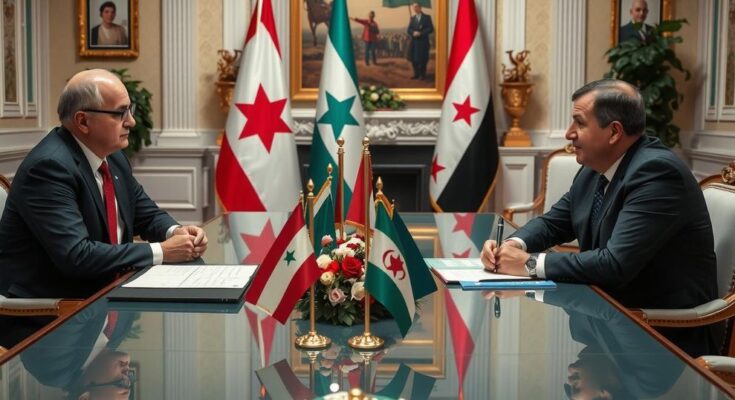Turkey, Russia, and Iran will hold talks in Qatar this weekend regarding the recent advances of Hayat Tahrir al-Sham in Syria. The meeting, under the Astana process, aims to navigate the evolving conflict, which has escalated tensions among regional powers. Both Turkey and Iran have stressed the importance of a political solution, while concerns about Kurdish forces and the resurgence of ISIS complicate the dynamics.
This weekend, Turkey, Russia, and Iran will convene in Qatar to address the recent developments in the Syrian conflict, particularly the recent advances made by rebel groups. Their meeting will occur during the Doha Forum, a gathering of international officials and experts. Turkey’s Foreign Minister, Hakan Fidan, will engage with counterparts from Russia and Iran in an effort to navigate the evolving situation under the Astana framework, which seeks a political resolution to the civil war that has persisted for over a decade.
Amidst shifting front lines, the recent gains by Islamist rebel group, Hayat Tahrir al-Sham (HTS), including the capture of Aleppo and Hama, signify a dramatic escalation that has reignited concerns among the government and its allies. Russian President Vladimir Putin and Turkish President Recep Tayyip Erdogan have engaged in discussions regarding the ongoing aggression against the Assad regime. Erdogan has emphasized the necessity for the Assad government to participate in political negotiations.
Turkey has consistently backed the Syrian National Army, which opposes the Kurdish-led Syrian Democratic Forces (SDF), a coalition supported by the United States in combating ISIS. The rise of HTS also prompted violence between rival armed factions. Both Russia and Iran, despite their support for Assad, are facing challenges that may complicate their positions in the region. Russia’s military focus is currently divided due to its involvement in Ukraine, and Iran is adversely impacted by regional confrontations, particularly with Israel.
Despite concerns regarding HTS advances potentially prompting Assad to negotiate, experts remain skeptical about the possibility of regime change. The strategic importance of Syria remains high for both Russia, due to its naval and air forces in the region, and Iran, as it seeks to maintain influence and connection across the so-called Shiite Crescent. Turkey’s apprehension towards Kurdish advancements, perceived as aligned with the PKK, underscores the complexity of the current dynamics as the nation hosts a significant number of Syrian refugees.
The ongoing tensions have also led to renewed conflicts between U.S.-backed SDF fighters and the Syrian government in northeastern regions. The U.S. military has conducted defensive operations in light of these developments, while maintaining a contingent of nearly 900 troops to support the SDF against ISIS. U.S. officials have criticized Assad’s rejection of political engagement as a core reason for the instability.
In summary, control over Aleppo, while not strategically vital for U.S. interests, poses potential implications for refugee movements and the resurgence of ISIS, a concern echoed by U.S. officials. Secretary of State Antony Blinken reaffirmed the necessity of preventing ISIS from re-establishing active operations in the region, while strategic experts warn of a reconstructing threat as ISIS may exploit the prevailing chaos.
The Syrian civil war, ignited in 2011, has seen significant involvement from global players such as Turkey, Russia, and Iran. These nations formed the Astana process to seek a political resolution to the conflict. Turkey has supported opposition factions against the Assad regime, while both Russia and Iran have provided military backing to the Syrian government. Recent escalations by HTS have altered the balance of power, necessitating urgent diplomatic discussions among these pivotal stakeholders. The complexities of regional security dynamics, particularly concerning Kurdish groups and U.S. interests, add layers to the conflict.
The upcoming trilateral talks in Qatar between Turkey, Russia, and Iran signify the urgent need to address the shifting landscape of the Syrian conflict, illuminated by recent rebel advances. As each nation grapples with its strategic interests, the prospect for a political settlement depends on the willingness of the Assad regime to engage with opposition forces amidst ongoing tensions. In an environment fraught with potential for renewed violence and humanitarian crises, efforts towards ceasefire and resolution are critical.
Original Source: www.voanews.com




